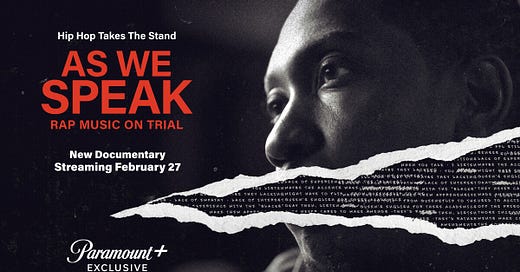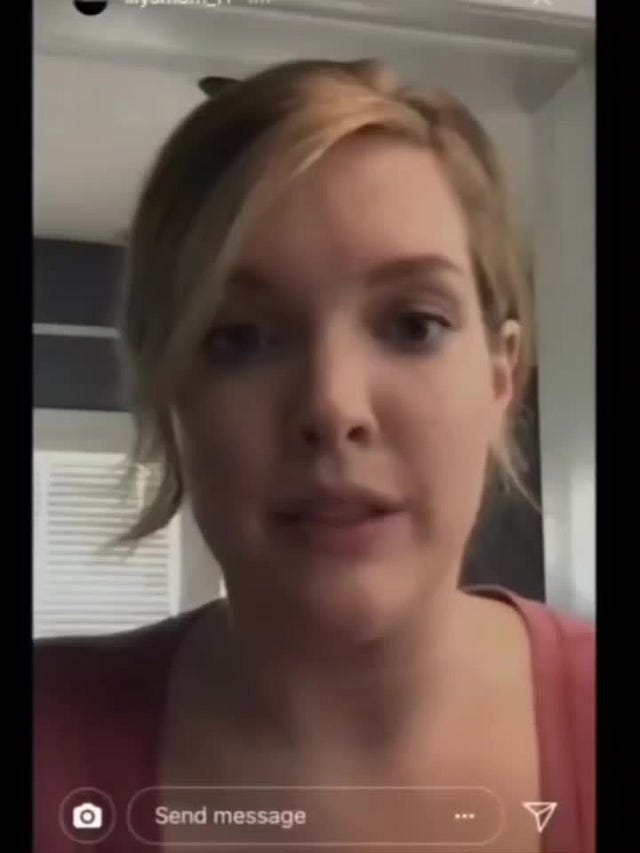‘As We Speak: Rap Music on Trial’ takes an uneven look at hip-hop and the criminal justice system
The new Paramount+ documentary, fronted by rapper Kemba, examines how rappers’ lyrics are used as evidence against them.
When I first heard there was a documentary subtitled “Rap Music on Trial,” I figured it was about the kinds of things that happened in the rap-related culture wars circa 30 years ago, such as police charging the stage at N.W.A. as they performed “Fuck the Police” or the high-profile obscenity trial of 2 Live Crew, around the same time. I also expected exploration of the Tipper Gore/PMRC nonsense and the battle over Body Count’s “Cop Killer.”
Those things all come up, albeit briefly, but As We Speak: Rap Music on Trial is at heart about something very different: In the present day, Rappers go on trial for unrelated crimes and have their lyrics used against them in court. It’s happening currently, in fact, in the trial of Young Thug, which has dragged on for over a year in Georgia, in the same jurisdiction as the Trump RICO case.
Rappers getting directly arrested for obscenity isn’t something that happens anymore, but this other method is much more prevalent these days, it appears.
Prosecutors discovered at some point that if a person accused of a crime has done any work in the rap game, their spoken lyrics may be used as evidence, even if the acts referenced in the lyrics have nothing to do with the crime the person is accused of.
This is a thing that happens; it’s very unfair and certainly a topic worthy of examination. The documentary, however, is unfocused and gets off-track frequently.
It’s one of the cringier things that can happen: A member of Congress, or possibly a cable news host, or even an Instagram mom, reading rap lyrics out loud, in disgust, with little to no knowledge of the context or anything else about the music. Bill O’Reilly, when he was on Fox News, used to rail against “thug rappers” on a nearly nightly basis; the tradition of repugnant racism in that time slot did not start with Tucker Carlson or Jesse Watters.
Atlanta brilliantly parodied this:
 Tiktok failed to load.
Tiktok failed to load.Enable 3rd party cookies or use another browser
It turns out that prosecutors do this, too. With often disastrous consequences.
J.M. Harper is the director of the documentary, while the rapper Kemba fronts the film. Hetalks to rappers, lawyers, and criminal justice experts to establish this phenomenon. Killer Mike is interviewed, presumably before his high-profile arrest during the Grammy Awards.
Rap lyrics are “prejudicial,” the experts say in the film, and can put certain thoughts in the minds of a jury.
As one great scene involving a song called “Bad Man’s Blunder” demonstrates, old folk and country songs could be pretty violent, too, with lots of songs about killing wives, judges, sheriffs, and men in Reno. We also see a group of people arguing about whether talking about crime in rap lyrics is worth it or not, and how that fits in with questions of authenticity.
The film, however, sometimes gets off track and feels the need for long disquisitions on the entire history of Jim Crow, mass incarceration, and government surveillance. These are important questions, of course, but they sometimes get far away from what the documentary is about.
Also, the conceit that the film is built around, with a fictitious trial in which Kemba is himself tried for a crime with his lyrics being used against him, is kind of silly. Was there not a real trial of which footage was available?
The other question is, what is the solution to this problem? Juries have shown that they buy this stuff, or else prosecutors wouldn’t do it. Could this tactic be made illegal? I’m not sure how.
As We Speak is a thought-provoking doc, but ultimately, it doesn’t put everything together. The film is streaming on Paramount+.





